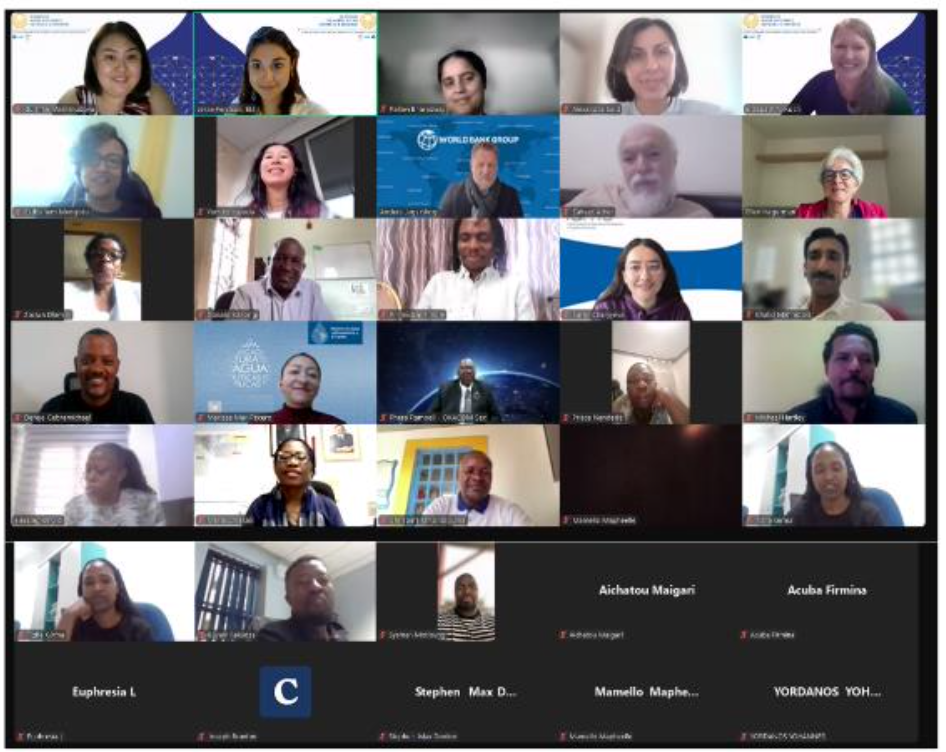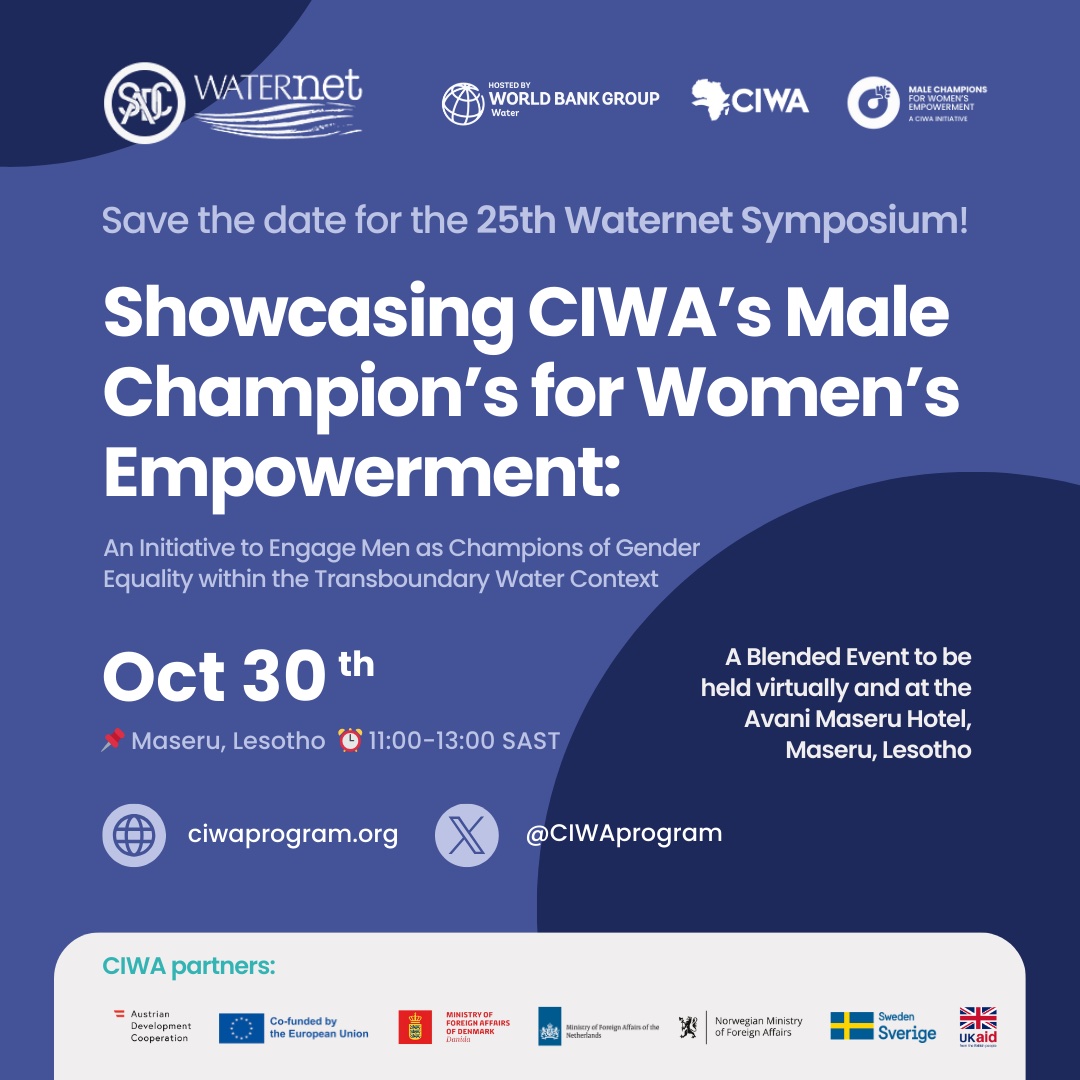How can men intentionally stand up for women?
Posted in : Blog on 28 October 2024
Highlights from the online Seminar co-hosted by Women in Water Diplomacy Network (WWDN) and CIWA Program’s Male Champions for Women ’s Empowerment (MCWE).

“To achieve gender inclusion, one has to be intentional” according to Dr. Zodwa Dlamini, an international transboundary water management specialist and one of three keynote speakers who laid the foundation for small group discussions at an interactive online exchange seminar co-hosted by Cooperation International Waters in Africa’s (CIWA) Male Champions for Women’s Empowerment (MCWE) initiative and Women in Water Diplomacy Network (WWDN). The application of a gender-intentional approach aligns with CIWA’s adoption of a transformative approach to gender and social inclusion since both approaches call for men and women to work together to actively transform gender unequal relations by taking collective and ongoing steps to overcome deep-seated patriarchal norms.
Gender intentional approaches also require the adoption of proactive measures to create equal opportunities by addressing the unique challenges faced by women and other vulnerable groups. This approach is in keeping with the mandate of the Male Champions for Women’s Empowerment. Launched in June 2023, CIWA established this initiative as a way to enable men committed to women’s empowerment to proactively step forward to tackle some of the gender inequalities that have prevented women from becoming leaders and decision makers within the transboundary water domain.
Partner with Women in Water Diplomacy Network and get an innovative approach
Through its support to women’s empowerment, CIWA has learned that working in a male-dominated sphere can mean bumping up against male resistance to forfeiting power. CIWA therefore approached Women in Water Diplomacy Network to partner on this event because of its long-standing efforts to enhance the collective capacity of women and to support the engagement of women water leaders in decision making and peace building processes. Since men tend to have privileged access to other men in the water sector, Male Champions for Women ’s Empowerment was established as a counterpoint to efforts to directly empower women by providing an important entry point for men to champion women’s empowerment and leadership through individual and collective efforts to address male resistance to sharing power.
The co-hosting of this online event (For a full recording of the event, click here. ) is the first in a series of actions that the Male Champions have identified to facilitate learning and the identification of concrete actions that men can take to stand up for gender equality. In addition to being participatory in nature, the event adopted an innovative approach by offering an opportunity for cross-cultural learning through the participation of 56 men and women coming from more than 40 countries. The small group discussions were specifically set up to create a space for female participants to talk freely with their male counterparts about the challenges women face operating in an environment where they are frequently excluded. Some of the challenges participants shared included women having to navigate cultural norms that favor men and program women to be less assertive, a failure to move from commitment to implementation, and a lack of accountability. Women also identified specific challenges operating in a gender-unfriendly workplace including the absence of child care and the tendency to hire male staff because of the preference for male-dominated backgrounds such as engineering.

Screenshot of participants during the event on September 17, 2024.
One woman shared her experience of being excluded from the “brotherhood” where men are able to coalesce and support one another to advance in their careers within the water sector. Another woman spoke about her experience as the first woman graduate student who was unable to participate in field work activities with male water management students at the Agricultural University in Peshawar Pakistan. Her experience ended on a positive note because measures were taken to overcome the barrier by sensitizing male colleagues to foster acceptance and protection during field work. This ultimately led to her pursuing her PHD and joining the staff of the Water Management program as a Professor.
Innovative ideas of actions that men can take to champion women’s empowerment
Participants from the groups were not daunted by the long list of challenges. In the second part of the small groups discussions, they put their heads together to come up with a diversity of innovative ideas of actions that men could take to champion women’s empowerment. Ideas included the promotion of a ‘care culture’ where empathy becomes the norm, establishing and promoting men as role models and mentors and learning from the successes of other male-dominated sectors. One group was particularly creative in recommending an approach called ‘Allying to Elevate’ where men can support women in all situations within the water sector. As the group noted, this could include focussed mentoring in a male dominated environment to make a woman feel she is “one of the boys” and creating a transformed environment where her gender “disappears”.
Feedback at the end of the session together with input from the Exit Survey confirmed that the event was seen as being relevant and applicable to professional work. It was also considered an excellent opportunity to gain a more in-depth understanding of the challenges women face being leaders in the transboundary sphere. Most importantly for men and women alike, it was seen as a source of ideas on how to recruit and engage men on gender equality. Male Champions for Women’s Empowerment (MCWE) initiative plans to carry on gathering insights on challenges and solutions on October 30 at the upcoming Waternet Symposium in Lesotho. (See Poster Below).

Special thanks due to the ignite inputs from Phera Ramoeli, Dr. Zodwa Dlamini and Donald Kasongi, as well as to Gulzhan Makhmudova, Dr. Bethlehem Mengistu and Alexandra Said for supporting the small group discussions! Huge thanks to the organizing team – including Elizabeth A. Koch, Jesse Ferraioli, Ellen Hagerman, Anders Jägerskog and Charles Gilman.
The session’s after-action report is now available on the CIWA website.
For a full recording of the event, click here.
Learn more
Blogs and Podcasts
Promoting a Gender-transformative Approach in the Transboundary Water Sector
Male Champion’s For Woman Empowerment: Who has the power to make decisions?
Advancing towards a more gender equal world in transboundary water management in Sub-saharan Africa
Glass half full: An equal share for women in decisions on 60% of the world’s freshwater
Sahel region: Training the next generation of groundwater specialists in the Sahel
Eastern Nile
The next generation of water professionals working towards a new era of cooperation
Asia Namusoke: Making a difference for her Ugandan community and the climate
Southern Africa
Mathongonolo Mmese: An inspiring hydro geologist in Botswana
Mfundo Macanda: Developing climate-smart agriculture in the Eastern Cape
Resources


